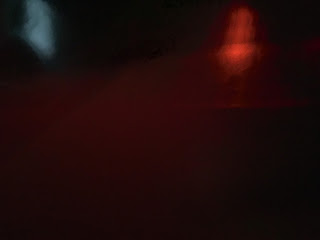Another Taxi day. c.2018
 |
| MTN Taxi Rank. Line No.9 |
I am doing a bad job of leaving on time. I set aside an hour for leaving which usually involves inspired makeup retouches and slapping together the lunch I’ll devour before the end of the second class I’ll be teaching that day. It’s always shocking to leave Yellow Wall to be swallowed up by the dry Joburg heat, but I’m becoming accustomed to the feeling of sweat dripping down my decolletage when I hop onto the local taxi to MTN/Wanderers Taxi Rank at the corner of Owl and Menton Road. I always hope to catch the seat at the door so I can be the window master and ensure we get good ventilation and that the sweat—now passing the three pairs of floating ribs under my breasts—stains its cooling effect on my overly moist skin instead of my clothes.
Owl Street, left onto Annet Road, the turn off left onto Enoch
Sontonga Avenue passed Sturrock Park Stadium onto a trafficked Jorissen where
outsourced security guards dressed in black stand guard against students who
can’t afford to pay tuition at Wits University; then right onto Bertha Street
to face the Mandela Bridge—away from reminders that Fees have not fallen and
that the streets remain populated with more pressing matters than higher
education; and into the city we dip, as we take a final left onto Lilian Ngoyi.
I used to fear the inner city, especially the MTN/Wanderers
area. I’d imagined it was like the filth Ayi Kwei Armah describes in the Beautyful Ones Are Not Yet Born, “covered
thickly with the juice of every imaginable kind of waste matter.”
Johannesburg CBD is made up of one way streets. We flow up
Rissik Street and head closer to the potjie aroma of scents coming from
ingredients such as counterfeit clothing, hospice and third-hand thrift
costumes in piles along the streets, fast-food and street food, fruit and
possibly cheap labour. Symbols of influence. Testimonies of Western modernity
held over the heads of everyday people who will never reach the upper echelon
that is constantly recreated to distance ‘us and them’. The city bowl, where
the hope of escaping from poverty comes in the form of offering hand-to-mouth
prices in the exchange of goods multiplied by their hundreds in a five kilometre
stretch.
Moving along to De Villiers Street, across the back street of
Park Station I remember an early morning taxi to Wanderers Taxi Rank where I
saw the community of homeless folk waking up along this street that would later
become peopled with travellers and vendors and municipal officials who always
seemed to be in between a lunch break, smoke break or a break to catch up on
the word on the street. These conveniently lasted longer than the work to be
covered that day. Who could attempt to clear the streets from the toxic waste
of rotting fruit and food, fermenting bodily fluids, solids and deteriorating dreams
without taking a series of five minute breaks? This is an arduous task that
involves deep meditation and a sense of dignity that has no roots in perception
and monetary reward. I wonder what the plan of progression for the municipal
workers are: most of them women, they are done up in thick, darkened eyebrows
and bright lip colours adorning overly powdered faces despite the unflattering
fit and colour of their blue construction overalls. One hopes that after work,
being able to afford the pit of cheap clothes and makeup doesn’t equate their
value. No one should be abused like this; no one when the dilapidation of the
inner city is a combination of overpopulation, a misuse of funds and a possible
Imposter syndrome the citizens of this old town have adopted.
Approaching Wanderers Street where the remainder of us will be
let out into the city to make pace for the
MTN and Wanderers Taxi Ranks, I consider how a single taxi ride takes me
from quiet upper middle class suburbia, collides with the doors of learning,
introduces me to the colour and pain of making-ends-meet and deposits me safely
into the center of the City of Gold where little on the street shines with that
precious mineral except the glimmer of dying dreams in the eyes of the everyday
people.

Comments
Post a Comment